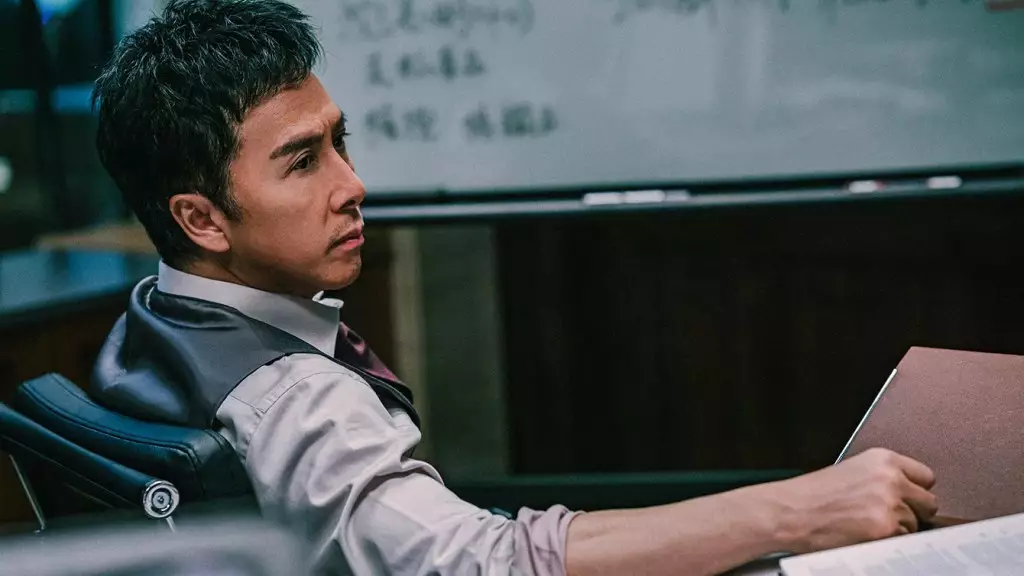The cinematic landscape often seeks to blend genres, creating a more engaging experience for its audience. Donnie Yen’s latest film, **The Prosecutor**, is an ambitious effort to merge action with courtroom drama, aimed at highlighting the intricacies of the Hong Kong legal system. However, this film raises critical questions: Does it genuinely succeed in portraying the battle for justice, and does it align with the expectations of Yen’s loyal fanbase?
At its core, **The Prosecutor** presents an exploration of justice frustrated by a flawed legal system. Donnie Yen, renowned for his martial arts prowess, steps into the role of Fok Chi Ho, a devoted police officer turned prosecutor. His transition from law enforcement to judicial duties is catalyzed by a disillusionment with law enforcement’s ineffectiveness against crime, presenting a character driven by a seemingly noble purpose – to uphold justice and serve the community. However, herein lies the film’s initial inconsistency: while Yen portrays a character with strong moral convictions, the vehicle upon which these convictions ride often feels heavy-handed, diluting the impact of the underlying themes.
As Fok struggles against a bureaucratic system more interested in expediency than justice, the film draws attention to systemic flaws. Yet, the sheer volume of legal jargon and technical jargon presented is overwhelming, particularly for audiences unfamiliar with Hong Kong’s legal nuances. The delivery comes across as pedagogical rather than cinematic, making it difficult for viewers to become emotionally invested in Fok’s journey without feeling overwhelmed by the details.
Fok Chi Ho is portrayed as a man of the people, frequenting the subway and budget eateries, in stark contrast to his privileged peers. This characterization attempts to ground him in reality, creating a relatable figure for the audience. Yen’s execution of this role is commendable, showcasing a range of emotions that reflect frustration, integrity, and determination. However, at times, it feels as though Fok’s intense dedication to due process overshadows his ability to engage in traditional action sequences, which may leave hardcore martial arts fans wanting.
Yen, also stepping behind the camera as director, seems consistently aware of his age—61— and the physical constraints that accompany it. While he acknowledges the need for action, much of it takes place through supporting characters, such as the younger cop Lee portrayed by MC Cheung. This decision may have been prudent, yet it inadvertently diminishes the impact of Yen’s martial arts legacy in the film.
The narrative structure poses another challenge to the film’s success. While it ambitiously intertwines elements of courtroom drama with action sequences, the film’s pacing suffers as a result. The courtroom moments can feel laborious, with essential information presented in such a rapid-fire manner that it risks alienating segments of the audience. Instead of seamlessly flowing between genres, the jarring transitions between intense action and dense legal dialogues can make it difficult for viewers to stay engaged.
Even the climax, where Fok resorts to traditional martial arts confrontations aboard a bustling subway, feels like a forced attempt to satisfy loyal fans looking for action. This pivot to street justice seems almost out of place within the broader context of the film’s narrative, leading to a sense of inconsistency that detracts from its overall effectiveness.
One of the most commendable aspects of **The Prosecutor** is its timely reflection of contemporary issues within Hong Kong’s legal landscape, especially against the backdrop of recent legislation. The themes of justice, truth, and public service intertwined with a faulty legal system resonate deeply in today’s climate. While the film does not overtly address the complexities of the National Security Law, its substratum highlights a society grappling with the distinction between legality and justice.
However, the film stops short of making a strong political statement, choosing instead to focus on the personal journey of its protagonist. This decision, while ensuring character depth, risks a certain level of detachment from the broader socio-political issues that could have enriched the narrative further.
Donnie Yen’s **The Prosecutor** is an audacious attempt to blend courtroom drama with action-packed moments. While it provides a commendable portrayal of a dedicated prosecutor caught in a flawed system, the film ultimately struggles with pacing and tonal inconsistencies that might leave some audiences disengaged. Yen’s ambition to broaden his dramatic range is evident, yet the reliance on complex legal dialogue and the sporadic nature of its action sequences prevent it from fully resonating with both action aficionados and legal drama enthusiasts. As such, while **The Prosecutor** may shine a light on vital societal issues, the film feels like a lost opportunity to deliver a more potent message within a compelling narrative framework.

